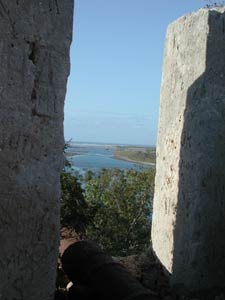 "Azemmour
is a town in the region of Duccala which was built by the Africans on
the coast, where the River Ommirabih meets the Ocean. It is quite large
and has many inhabitants. It is constantly being visited by Portuguese
merchants, hence the people are well dressed and well protected.
"Azemmour
is a town in the region of Duccala which was built by the Africans on
the coast, where the River Ommirabih meets the Ocean. It is quite large
and has many inhabitants. It is constantly being visited by Portuguese
merchants, hence the people are well dressed and well protected.
The
population is divided in two parties, yet it is at peace. Its region
produces much wheat. Yet, there are no fruit groves, or gardens, only
fig trees. The river is a great source of revenue as people pay for
the right to fish. Fishing season starts in October and ends in late
April[...]
The
Portuguese merchants come once a year to buy great quantities of fish.
They pay for most of the fishing rights so they convinced their King
to take hold of the town. He sent a fleet with several ships. But the
fleet failed to capture the town as it was managed by an inexperienced
captain.
Two
years later, the King sent another fleet, with two hundred ships. When
the people saw this fleet, they lost all hope and fled in such a panic
that more than eighty people died of suffocation. One unfortunate prince,
who had come to the town's rescue, not knowing how to escape, repelled
down the city walls using a rope. People were running about in all directions,
some bear footed, others on horse back. It was a pity to see the children,
old men , women and young girls run around, not knowing where to hide.
Before
the battle started, the Jews-who had previously signed a truce with
the Christians agreeing to hand over the town provided they retain their
privileges and safety- opened the doors to the city. The Christians
walked in.
The
population fled to Sale and to Fes. Thus they have been punished for
their great crime of sodomy- a vice so commonly practiced there that
fathers were on the look out for companions for their sons!
The
city was captured in 918 [1513], while I was traveling in the Sudan.
" (Leo, 121)